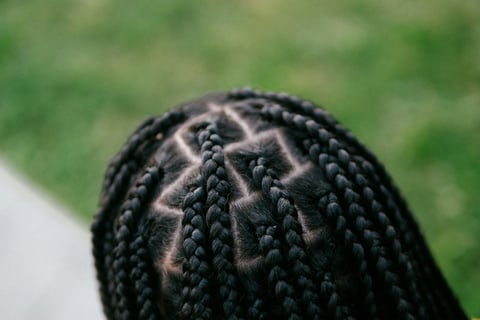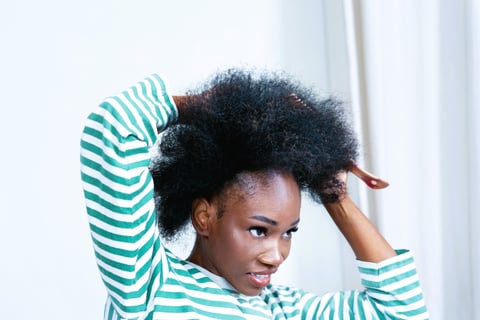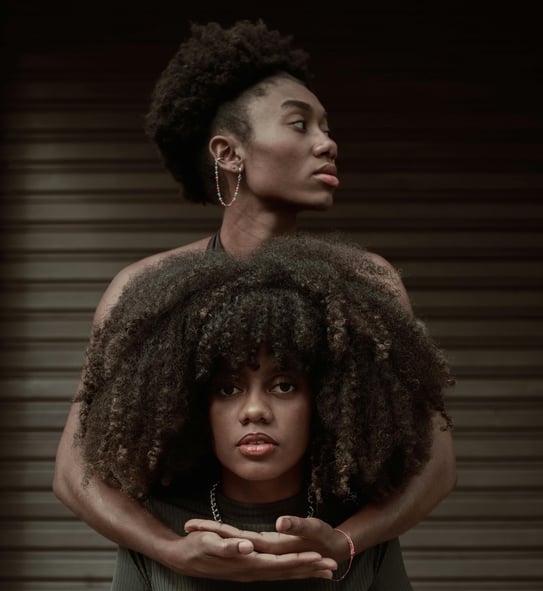Understanding Scalp Health and Chemical Treatments


For Black women who chemically treat their hair, scalp health is a cornerstone of overall hair wellness that often gets overlooked. This guide explores the unique challenges chemical treatments present to scalp health, identifies common scalp conditions affecting Black women, and provides practical at-home care strategies to maintain a healthy foundation for beautiful hair.
Identifying Common Scalp Ailments
For Black women with chemically altered hair, understanding common scalp conditions is essential for maintaining hair health and preventing long-term damage. These conditions often develop or worsen due to the harsh chemicals in relaxers, dyes, and other treatments that can compromise the scalp's natural protective barrier.
Traction Alopecia and Chemical Alopecia
Alopecia, or hair loss, is particularly prevalent among Black women who chemically treat their hair. Traction alopecia develops from consistent tension on hair follicles, while chemical alopecia results directly from chemical damage. Early signs include thinning along the hairline and temples, scalp tenderness, and small bumps around follicles. Without intervention, this condition can progress from temporary to permanent hair loss, with visible scalp inflammation and scarring that prevents regrowth.
Seborrheic Dermatitis and Dandruff
Dandruff manifests as white or yellowish flakes accompanied by itching and redness. For chemically treated hair, this condition often worsens as chemicals strip the scalp's natural oils, triggering the overproduction of sebum as compensation. Factors that contribute to dandruff include infrequent washing (often due to styling concerns), product buildup, and sensitivity to chemical ingredients. The distinction between regular dandruff and seborrheic dermatitis lies in severity—the latter presents with larger, oilier flakes and more pronounced inflammation.
Contact Dermatitis
Chemical treatments can trigger allergic reactions on the scalp, causing redness, burning, and intense itching. This typically occurs immediately after chemical application but can develop over time with repeated exposure. The scalp may appear inflamed with small fluid-filled blisters in severe cases.
Folliculitis
This inflammatory condition affects hair follicles, appearing as small, red bumps or pustules that resemble acne. Chemical treatments can exacerbate folliculitis by irritating already inflamed follicles. Without proper care, this can lead to scarring alopecia, where hair follicles are permanently damaged.
The chemical compounds in relaxers and permanent dyes, including sodium hydroxide and ammonia, fundamentally alter protein structures in both hair and scalp. This alteration weakens the scalp's natural defense mechanisms, making it more susceptible to fungal and bacterial infections. Recognizing these conditions early is crucial, as chronic inflammation can lead to central centrifugal cicatricial alopecia (CCCA), a form of scarring hair loss that begins at the crown and radiates outward—a condition disproportionately affecting Black women.


At-Home Care for a Healthier Scalp
Maintaining scalp health between chemical treatments requires consistent, gentle care focused on moisture balance, inflammation reduction, and protective practices. A comprehensive approach can significantly reduce the risk of developing serious scalp conditions while promoting healthier hair growth.
Essential Moisturizing Practices
Proper hydration is fundamental for Black women with chemically treated hair. The scalp needs regular moisturizing to counteract the drying effects of chemical processes. Create a weekly pre-wash ritual with natural oils like jojoba or avocado oil, which closely mimic the scalp's natural sebum. Apply these oils to the scalp at least 30 minutes before washing, gently massaging to stimulate circulation and enhance penetration. This practice helps restore the moisture barrier disrupted by chemical treatments.
Gentle Cleansing Regimen
Select sulfate-free, pH-balanced shampoos specifically formulated for chemically treated hair. Products containing ingredients like tea tree oil, aloe vera, and salicylic acid help combat fungal growth and gently exfoliate without stripping essential moisture. Wash your hair regularly but not excessively—typically once a week for most chemical treatments, adjusting as needed based on your specific scalp condition.
Therapeutic Scalp Massage
Incorporate a 5-10 minute scalp massage into your routine at least twice weekly. This practice not only distributes natural oils but significantly improves blood circulation to hair follicles, potentially stimulating growth and reducing inflammation. Use fingertips (not nails) in gentle circular motions, working from the nape toward the crown.
Timed Chemical Treatments
Extend the time between chemical processes to at least 8-12 weeks, allowing your scalp adequate recovery time. Never apply relaxers to an already irritated scalp, and always conduct a patch test before chemical applications, even with products you've used before, as sensitivity can develop over time.
Specialized Treatments for Common Conditions
Though we are not medical professionals, we’re passionate about creating a space where real, honest conversations about scalp health and hair care can be had—especially in our community. Too often, concerns like dandruff, seborrheic dermatitis, or alopecia are suffered in silence. At Untamed, we can talk about it.
For dandruff and seborrheic dermatitis, it’s helpful to rotate between a medicated shampoo and a moisturizing shampoo to prevent over-drying. A simple, effective pre-shampoo treatment is apple cider vinegar diluted with water in a 1:3 ratio, which can help balance scalp pH and reduce flaking.
When addressing alopecia concerns, a blend of castor oil and three drops of rosemary essential oil massaged into affected areas three times a week may help stimulate hair follicles.
Always monitor how your scalp responds to any treatment. If you notice persistent redness, worsening hair loss, severe itching, or painful lesions that don’t improve within two weeks, it’s important to consult a dermatologist—especially one experienced with ethnic skin and hair. These symptoms might indicate underlying conditions requiring professional care, like prescription topical steroids for inflammation or oral antifungals for more severe cases.
At the end of the day, prevention through consistent, mindful care is the most effective way to protect both your scalp health and your hair’s longevity. The health of your hair is directly tied to the health of your scalp. Prioritizing it isn’t vanity — it’s essential maintenance, and it matters for your confidence too.
Let’s keep these conversations going. You are not alone.
If you’ve ever washed your natural hair and watched it shrink to a fraction of its length, you’re not alone. Black hair can shrink up to 75% of its actual length, making it appear much shorter than it truly is. While some see this as frustrating, shrinkage is actually a scientific marvel and a strong indicator of hair health.
Embracing Your Natural Texture
"But if a woman have long hair, it is a glory to her: for her hair is given her for a covering." – 1 Corinthians 11:15
Beloved sisters, your hair is not just an accessory—it is a divine gift, a part of your identity that God has beautifully designed. Yet, for too long, many of us have been misled to believe that our natural texture is something to be tamed, altered, or hidden. The truth is, your hair in its natural state is a masterpiece!
Shrinkage? That is a sign of strength and health. Those kinks, coils, and curls? They are God’s fingerprint on you, a reflection of His intentional and wonderful creation. "I will praise thee; for I am fearfully and wonderfully made" (Psalm 139:14).
We must protect what God has given us—not only for beauty but for our health. Studies are revealing alarming connections between harsh chemical relaxers and serious illnesses, including various cancers. This is not just about hair; this is about life, about honoring the temple God has entrusted to you.
The world may try to convince you that beauty looks a certain way, but Galatians 6:4-5 reminds us not to compare ourselves to others. Your crown was designed specifically for you. Love it, care for it, and wear it proudly. With the right moisture and nourishment, your natural beauty will flourish.
What Causes Shrinkage?
The secret behind shrinkage lies in the unique structure of Black hair follicles. Unlike straight or wavy hair, which grows from round or slightly oval follicles, Black hair emerges from more elliptical or flattened follicles. This creates the tight coils and curls that define natural Black hair. The more oval the follicle, the tighter the curl—and the greater the shrinkage.
Moisture also plays a major role. When hair is properly hydrated, hydrogen bonds within each strand allow it to return to its natural, coiled state. This means that shrinkage is often a sign of good elasticity and moisture retention, both of which are essential for healthy hair.
Shrinkage: A Sign of Hair Health
Rather than viewing shrinkage as a problem, it’s important to recognize it as a positive indicator. Studies show that 83% of hair care professionals consider shrinkage a sign of strong, well-moisturized hair with proper curl formation. In fact, 62% of Black hair care routines focus on managing shrinkage rather than eliminating it completely.
When hair is dry, damaged, or lacking protein, it struggles to return to its natural shape. This means that if your hair shrinks after hydration, it’s doing exactly what it was designed to do.
What Affects Shrinkage?
The amount of shrinkage you experience depends on several factors:
Humidity Levels – Hair absorbs moisture from the air, which can enhance curl definition and shrinkage.
Hair Porosity – High-porosity hair absorbs water quickly but loses it just as fast, affecting how much it shrinks.
Protein Balance – Hair needs both moisture and protein to maintain elasticity and bounce.
Curl Pattern – The tighter the curl, the more it naturally coils and shrinks.
Product Buildup – Heavy products can weigh hair down, reducing shrinkage and affecting curl definition.
Embracing Your Natural Crown
Shrinkage is not your enemy—it’s a powerful sign that your hair is strong, resilient, and healthy. While stretching techniques and styling options can help manage it, it’s essential to celebrate and care for your hair in its natural state. Confidence in God’s perfect design for you is the best styling product you could ever have. Protect your glory, cherish your health, and walk boldly in the beauty of who you are—just as God intended.
To keep your curls nourished and vibrant, try these two DIY hair masks designed to boost moisture and elasticity!


The Science of Shrinkage: Why It’s a Sign of Healthy Hair
Write your text here...
Inform.
Inspire.
Innovate.
wild Child Natural Hair
900 Commonwealth Place, Ste. 200 Virginia Beach, VA 23464
"My people are destroyed for lack of knowledge: because thou hast rejected knowledge, I will also reject thee, that thou shalt be no priest to me: seeing thou hast forgotten the law of thy God, I will also forget thy children."
© 2025 All rights reserved.